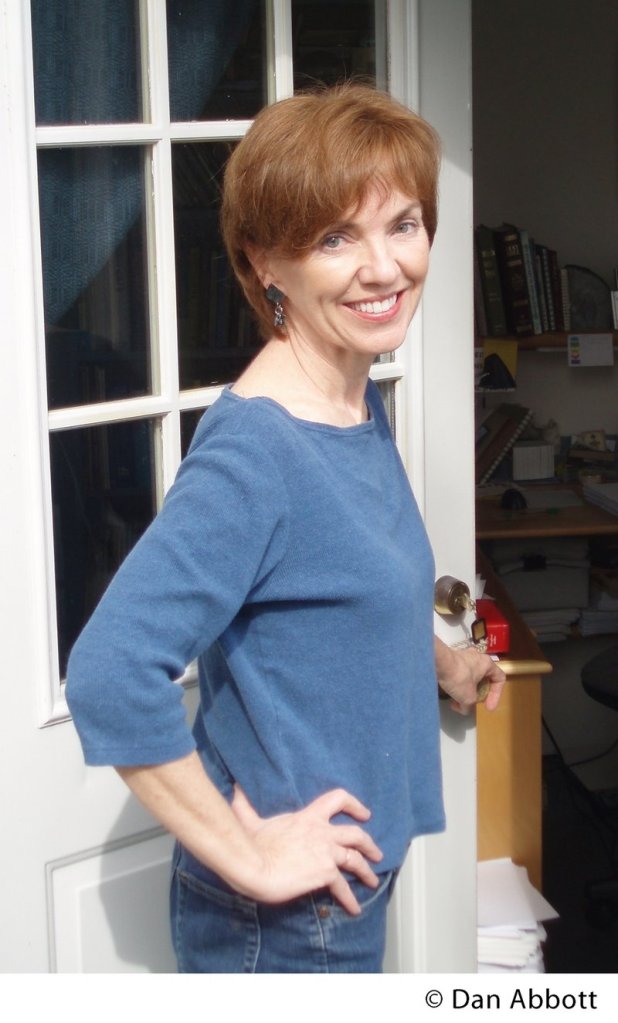Portland writer Monica Wood is on the fast track to the stratosphere. She’s already a star based on her four works of fiction, including the best-seller “Any Bitter Thing.” But her latest book, “When We Were the Kennedys: A Memoir from Mexico, Maine,” published earlier this month by Houghton Mifflin Harcourt, is delivering her to a much higher plane.
The New Yorker has chimed in with a long essay about the book and some of its themes, and the glowing reviews are flowing in from all corners.
Wood almost blushes when she talks about her gratification for the kind words coming her way. But, she notes, “the reviews I cherish the most are the ones from old friends and neighbors from Mexico.”
Wood grew up in a tight-knit Catholic family in the shadow of a mill, “a rumbling, hard-breathing monster that made steam and noise and grit and stench and dreams and livelihoods — and paper.” It was known affectionately around Mexico-Rumford as The Oxford.
“When We Were the Kennedys” is about her family in 1963, when their idyllic world came apart at the seams when her father dropped dead. It is about one family’s tragedy and how that family reconstituted itself, with subthemes about the mill itself and the Kennedys.
The mill gave Mexico its character and residents their livelihood. But all of that changed when a labor strike divided the town, which hasn’t been the same since.
And then JFK got shot.
The Kennedys were revered in the Wood household, and the national tragedy mirrored the personal tragedy of the Wood family.
“Their tragedy actually helped us through our tragedy,” she says.
Wood is making the rounds, and will read from her book at 2 p.m. today at the Louis T. Graves Memorial Public Library, 18 Maine St., Kennebunkport. We caught up with her last week before a reading at the Portland Public Library.
Q: Let’s start by talking about the title of book, which seems to grab everybody’s attention. “When We Were the Kennedys”: Where did it come from, what does it mean? What image were you hoping to suggest?
A: The title works in two ways. One, it refers to the way the Kennedy assassination worked as a kind of balm to our family’s grief. That the most glamorous family on Earth could have the same thing happen to them — father gone, instantly — made our own family feel less alone.
But looking at the title with a wider lens, and I tried to write the book with the widest possible lens, it’s about when “we” — that is, America — were the metaphorical Kennedys: On top of the world. We led the world in manufacturing, in economic security, in confidence. The book is about the year in which that began to change.
Q: I’d like you to talk about how your family bonded after your father’s unexpected death, and how your mother drew either influence or inspiration from Jackie Kennedy during her time of grief.
A: My mother was ashamed to be widowed, which I have since learned is not an uncommon reaction. Jackie’s grace in grief absolutely comforted my mother, helped restore her sense of dignity and pride. My mother was a strong woman undone by grief. Jackie helped her through it. I often wonder about all the women who lost husbands in 1963, and if the same phenomenon happened to them.
Q: This book is being called a memoir. As a fiction writer, how different or difficult was it for you to approach writing a memoir?
A: Memoir is a million times easier than fiction. I loved every second of writing this book. I already had the characters and the plot; all that was left was the fun part: the writing, the scene-making, the structuring. A pleasure!
Q: What inspired you to write this book? It’s very personal and evocative, with the sort of nuance and private details of your family that most people keep tight to the vest. Why this book, why now?
A: The book began as an essay called “My Mexico” that I was asked to write for the anthology “A Placed Called Maine.” About a year later, after a bad stretch in which I lost two friends and my father-in-law, I went back to that material because it was like going back to the comfort of home. Two years later, I sold it to Houghton Mifflin Harcourt.
Q: The mill becomes another character in this book. Describe its influence on your town and your life, then and today.
A: I can hardly overestimate the presence of the mill in my childhood, and I saved my most poetic writing for it. I mean, you could literally hear the thing breathing, like a large, ever-present animal.
These days it’s still operating, but as a shadow of its former self, going the way of all manufacturing in this state and in this country.
I don’t think there’s anyone who thinks it will still be here in 20 years. And I can’t tell you how it grieves me to say this.
Q: Do you get back to Mexico often? How do your memories fit with the reality of today?
A: I love my hometown, will always love it. I was just there last week. Two of my sisters are there, and also my husband’s family. He’s from Rumford Point. Which is a big reason we’re still thrilled to be married after 35 years.
Staff Writer Bob Keyes can be contacted at 791-6457 or:
bkeyes@pressherald.com
Twitter: pphbkeyes
Send questions/comments to the editors.



